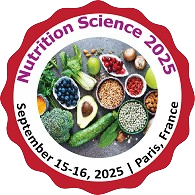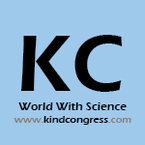Welcome Message
For nearly three decades, our congress has served as a prominent platform for scientific innovation and collaboration, advancing the fields of nutrition and food sciences on a global scale. This 29th edition marks a significant milestone, offering a comprehensive program that highlights the latest research, emerging trends, and critical challenges facing the industry. We are thrilled to welcome leading experts and delegates from around the world, fostering a rich exchange of ideas and interdisciplinary partnerships aimed at improving health outcomes through nutrition.
This year’s program is carefully curated to reflect cutting-edge advancements, new insights, and key issues in nutrition and food sciences. Attendees can look forward to an array of scientific symposia, keynote lectures by distinguished leaders, hands-on workshops, and poster sessions showcasing novel research findings. The congress offers a wealth of learning and networking opportunities, providing valuable knowledge for all participants.
Additionally, we are excited to host a diverse, international group of experts and attendees, bringing together a wealth of perspectives, experiences, and expertise from across the globe. This global representation enriches our discussions, broadens our understanding, and supports collaborations that transcend borders, all in pursuit of our shared mission to enhance health and well-being through advancements in nutrition.
In closing, we extend our heartfelt gratitude to all participants, speakers, sponsors, and partners for their invaluable contributions to the success of the 29th World Congress on Nutrition and Food Sciences. Let us take full advantage of this unique opportunity to learn, connect, and inspire one another as we strive towards a healthier, more sustainable future for all.
Join us on September 15-16, 2025, in Amsterdam, Netherlands as we embark on this journey together!
About Conference
The 29th World Congress on Nutrition and Food Sciences, held on September 15-16, 2025, in Paris, France was a landmark event in the fields of nutrition and food sciences. This congress gathered leading experts, researchers, policymakers, and practitioners from across the globe, providing a vibrant platform for the exchange of ground breaking research, innovative ideas, and best practices in nutrition and food science.
With a focus on tackling contemporary challenges in health and nutrition, the congress covered a wide range of topics, from the latest advancements in nutritional science to strategies for promoting sustainable food systems and preventing chronic diseases. Attendees engaged in thought-provoking discussions, participated in interactive workshops, and had ample opportunities to network with peers across diverse disciplines.
Theme: Nutrition for a Resilient World: Advances, Challenges and Opportunities
Keynote speakers delivered compelling presentations on emerging trends and significant research findings, exploring the complex relationship between diet, health, and disease. Breakout sessions allowed for in-depth exploration of specific areas, including personalized nutrition, sustainable food systems, and the impact of nutrition on maternal and child health.
The congress also fostered partnerships aimed at translating research into policies and interventions to improve global nutrition outcomes. Participants left inspired, with new insights and tools to advance the field and promote health and well-being within their communities.
In summary, the 29th World Congress on Nutrition and Food Sciences was a resounding success, fostering collaboration, driving innovation, and mobilizing action towards a healthier and more sustainable future for all.
Participation/Presentation Options
Oral presentation: Oral Presentations may include the topics from researches, theoretical, professional or private practices in a concise manner. Individuals with personal experience are also welcome to present personal experiences or narratives which help others in everyday life. Speakers with a 30-minute slot should plan to speak for 20-25 minutes, and Keynote speakers should plan to speak for 40-45 minutes, with the remaining time to be used for questions and discussion by the Session Chair.
Workshop: For workshop presenters also, the topic of the talk will be the same as an Oral presentation with more specialized techniques and detailed demonstration. The generalized time duration for a workshop presentation is about 45-50 minutes. Interested participants can join with their respective team and present the workshop with their research coordinators with special group waivers on registration
Poster presentation: Student Poster Competition will be organized at the Nutrition Science 2025 conference is to encourage students and recent graduates to present their original research. Presenters will be given about 5-7 minutes to present the poster including questions and answers. Judges may ask questions during the evaluation of the presentation. This is an opportunity for young scientists to learn about the recent findings of their peers to increase their capacity as multidisciplinary researchers. Poster displays will be in hard copy format of 1x1 M long.
For more details regarding Poster Presentation and Judging Criteria view Poster Presentation Guidelines.
Webinar: The webinar presentation is designed for those interested attendees who cannot join in person due to schedule conflicts or other obligations. In this option, the presenter may record the presentation and their presentation will be presented in the Webinar presentation session
E-Poster: e-Poster is also similar to the webinar presentation. In this session, their presentation will be published in the form of a poster in the conference website and the presenter abstract will be published in the conference souvenir and journal with DOI.
Exhibition: Nutrition Science 2025 has the opportunity to exhibit the products and services from commercial and non-commercial organizations like Drug manufacturers, Clinical Trial Sites, Management Consultants, Chemists, Pharmacists, Business delegates and Equipment Manufacturers.
To know more about exhibitor booth details and benefits visit WHY TO EXHIBIT WITH US?
Send your queries to nutrition@europeconferences.com
Advertisement: The conference program is a valuable resource that all attendees refer again and again as they navigate the conference. Advertising in the conference program is a great way to market and can help you secure long term business.
Send your proposal to nutrition@europeconferences.com to know the available advertisement options and prices
Sponsor Nutrition Science 2025
Premium Sponsorship package
If you are not receiving our emails, please update your spam filter to allow messages from
nutritionscience@europeanmeets.com
-
Contact the main conference coordinator at nutritionscience@europeanmeets.com if you do not receive an acknowledgment or follow-up email within 48 hours after your registration or inquiry.
-
Before contacting us, please check your spam/junk folder to ensure our emails have not been filtered.
Group Registration Discounts:
We are pleased to offer affordable discounts for group registrations. For more information about group rates, please contact us.
Additional Information:
Please include your mobile phone number in your registration form along with your abstract for further communications.
Important Registration Information:
To facilitate smooth communication, please make sure to provide your mobile phone number in your registration form along with your abstract submission. This will allow us to contact you promptly if needed.
Ensuring effective communication is crucial for a successful conference experience. By following these guidelines, you can help us ensure that you receive all necessary updates and information regarding the 29th World Congress on Nutrition and Food Sciences.
Scientific Sessions and Tracks
Nutritional Epidemiology:
Nutritional epidemiology examines the links between dietary patterns, health outcomes, and disease prevention at a population level. Through large-scale studies and health data analysis, researchers identify correlations between nutrients or diets and health conditions like obesity, heart disease, and cancer. Using methodologies like cohort studies and trials, this field informs public health policies and dietary guidelines, despite challenges like recall bias and confounding factors. Nutritional epidemiology provides a foundation for understanding diet-health connections and guiding public health interventions.
Nutritional Biochemistry:
Nutritional biochemistry investigates how nutrients interact with the body at a molecular level, impacting metabolism, gene expression, and overall health. This field studies how carbohydrates, proteins, fats, vitamins, and minerals support processes like energy production and disease prevention. Insights from nutritional biochemistry inform dietary guidelines and medical treatments, particularly in managing conditions like obesity, diabetes, and cardiovascular disease.
Clinical Nutrition:
Clinical nutrition applies nutrition science to prevent and treat diseases, developing individualized dietary plans based on medical needs and histories. Clinical nutritionists assess nutritional status, address deficiencies, and create strategies to improve health outcomes. Evidence-based approaches are used to support well-being and quality of life through personalized dietary care.
Nutrigenomics and Nutrigenetics:
Nutrigenomics studies how nutrients influence gene expression and health, while nutrigenetics examines how genetic variations affect nutrient responses. Together, these fields enable personalized nutrition, tailoring dietary recommendations to genetic predispositions and metabolic pathways. This approach fosters optimal health and disease prevention.
PublicHealth Nutrition:
Public health nutrition merges public health principles with nutrition science to improve population health. Addressing food access, dietary patterns, cultural factors, and socioeconomic influences, this field focuses on malnutrition prevention, promoting healthy diets, and reducing diet-related diseases. Public health nutrition advocates for policies, community programs, and individual behavior changes to create supportive environments for lifelong health.
Nutritional Psychology:
Nutritional psychology studies the relationship between diet and mental health, linking nutrients with mood and cognition. Omega-3 fatty acids, antioxidants, and nutrient-rich diets are associated with improved mental wellness, while high sugar and processed foods can harm mental health. This field promotes tailored dietary interventions to support psychological well-being.
FunctionalFoods and Nutraceuticals:
Functional foods and nutraceuticals offer health benefits beyond basic nutrition, targeting areas like digestion, heart health, and cognitive function. These products, which include probiotics, omega-3s, and antioxidants, are popular for proactive wellness and ongoing research promises further advancements in preventive health.
Maternal and ChildNutrition:
Maternal and child nutrition is essential for lifelong health, from pregnancy to early childhood. A balanced diet during pregnancy supports fetal development, while breastfeeding and nutrient-rich foods aid infant growth. Ensuring access to nutritious foods and education on healthy habits is crucial for both mothers and children.
Nutrition Education and Counseling:
Nutrition education and counseling equip individuals with knowledge on balanced diets and healthy choices. Personalized guidance fosters long-term wellness by focusing on nutrient-dense foods and reducing sugar, salt, and saturated fats, helping individuals make informed decisions in various food environments.
FoodScience and Technology:
Food science and technology blend biology, chemistry, and engineering to improve food products. This field examines food composition, preservation, and safety, addressing challenges like sustainability. Innovations in alternative proteins, food safety standards, and packaging solutions enhance nutrition and accessibility, shaping our food landscape.
Nutrition and Aging:
Nutrition supports healthy aging by addressing changing physiological needs. Nutrient-rich diets help maintain muscle, cognitive function, and reduce chronic disease risks. Prioritizing hydration, antioxidants, and key vitamins promotes vitality, supporting a higher quality of life in later years.
Gut Health and Microbiota:
A balanced gut microbiota benefits digestion, immunity, and mental health. Prebiotics and probiotics, along with a healthy lifestyle, support beneficial bacteria. Fostering a diverse microbiome enhances resilience and promotes overall well-being.
Environmental Sustainability and Nutrition:
Sustainable nutrition practices promote both human and planetary health. Plant-based diets reduce environmental impacts, while local, organic produce supports biodiversity and conserves resources. Making eco-friendly food choices fosters a healthier planet for future generations.
FoodAllergies and Intolerances:
Food allergies and intolerances impact dietary choices and health, requiring careful label-reading and alternative foods. Understanding and managing these conditions, often with professional guidance, helps individuals avoid triggers and maintain balanced nutrition.
Nutrition and Cancer:
Nutrition plays a role in cancer prevention and care. Diets rich in fruits, vegetables, and whole grains support immunity and reduce inflammation, while reducing processed meats and sugars lowers cancer risk. Balanced diets provide powerful tools against cancer.
Nutrition and Mental Health:
Nutrition influences mood and cognitive health. Omega-3s, B vitamins, and minerals support brain function, while high sugar and processed foods can lead to mental health challenges. Balanced diets with nutrient-dense foods promote mental wellness and emotional stability.
Precision Nutrition:
Precision nutrition offers targeted dietary insights through brief, evidence-based content. By making healthy choices accessible and personalized, precision nutrition empowers individuals to optimize health and achieve wellness goals.
Nutrition and Inflammation:
Anti-inflammatory diets support health by including leafy greens, berries, and omega-3s, which counter inflammation. Processed foods and sugars, in contrast, can promote inflammation. Prioritizing anti-inflammatory foods supports overall health and resilience.
Nutrition and Immune Function:
Nutrition strengthens immune defenses, with vitamins C, D, and E, as well as minerals like zinc, playing key roles. Diets rich in fruits, vegetables, and lean proteins support immunity, while poor nutrition weakens immune responses.
Nutrition and Neuro degenerative Diseases:
Nutrition helps prevent neurodegenerative diseases. Antioxidants, omega-3s, and vitamins support brain health, while processed foods increase cognitive decline risks. Balanced diets with nutrient-dense foods protect brain function and longevity.
Integrative Approaches to Nutrition and Health:
Integrative nutrition combines traditional and complementary therapies, addressing physical, emotional, and spiritual well-being. By personalizing nutrition and lifestyle changes, it fosters holistic health and longevity.
Nutrition Policy and Advocacy:
Nutrition policy shapes food systems and access to nutritious options. Advocacy amplifies community voices, fostering equitable access to healthy foods and supporting public health. Collaborative policy efforts aim to make healthy food accessible and affordable.
Nutrition and Sleep Health:
Nutrition and sleep are essential to health, with nutrients influencing brain function and sleep quality. Healthy diets support restful sleep, while poor sleep leads to cravings for unhealthy foods. Balanced nutrition and quality sleep enhance resilience and well-being.
Nutrition and Cardiovascular Health:
A balanced diet supports heart health, with fruits, vegetables, and omega-3s reducing heart disease risks. Limiting fats, sodium, and sugar supports heart function and helps manage blood pressure, cholesterol, and inflammation.
Food Chemistry:
Food chemistry studies food components like carbohydrates, proteins, vitamins, and minerals. It focuses on food composition, safety, and additives, driving advances in preservation, flavor development, and nutrition analysis for safer, higher-quality foods.
Nutri food Chemistry:
Nutrifood chemistry investigates the nutritional value of food ingredients, focusing on synthesizing nutrients and preservatives for food quality. It helps create safe and nutritious food products through improved food science techniques.
Agronomy and Agricultural Chemistry:
Agronomy applies chemical principles to agriculture, enhancing crop yields, soil health, and food quality. By addressing challenges like pests and soil depletion, it supports sustainable food production and improves food security.
Flavor Chemistry and Agricultural Chemical Science:
Flavor chemistry studies the compounds responsible for food aromas and flavors, aiding in product development and quality control. Agricultural chemical science focuses on safe, effective crop production, supporting sustainable agriculture and food safety.
Market Analysis
The global Nutrition and Food Sciences market is experiencing rapid growth, fueled by a rising emphasis on preventive healthcare and increased awareness of the significant role of diet in health and wellness. The industry encompasses a diverse range of products and services, including dietary supplements, functional foods, nutraceuticals, and personalized nutrition solutions. As of 2024, the global Nutrition and Food Sciences market is valued at approximately $450 billion and is projected to grow at a CAGR of 6.5% over the next five years.
Key Growth Drivers
-
Rising Consumer Awareness: Consumers are increasingly conscious of the connection between nutrition and health, boosting demand for products that promote wellness and help prevent chronic illnesses.
-
Aging Population: With a growing aging population, there is higher demand for nutritional products that support age-related health and enhance quality of life.
-
Technological Advancements: Innovations in biotechnology and food sciences have enabled the creation of enhanced products, such as functional foods and personalized nutrition plans tailored to individual health needs.
-
Government Initiatives: Global regulatory bodies are supporting health and wellness campaigns, such as those targeting obesity reduction and promoting healthy diets, which are further stimulating market growth.
Challenges
-
Regulatory Hurdles: Strict regulations govern the Nutrition and Food Sciences industry, with specific standards for product safety, efficacy, and labeling. Compliance with these regulations can pose significant challenges, particularly in a global context.
-
High R&D Costs: The development of new nutritional products and technologies demands substantial investment in research and development, creating a barrier to entry for smaller companies.
-
Market Saturation: As the market becomes more crowded, differentiation through innovation, quality, and branding is becoming increasingly crucial.
-
Consumer Skepticism: Although the market is expanding, some consumers remain uncertain about the efficacy of certain nutritional products, particularly within the supplements segment.
Future Outlook
The future of the Nutrition and Food Sciences market looks promising, with several emerging trends expected to drive growth:
-
Personalized Nutrition: Advances in genomics and data analytics are leading to personalized nutrition solutions tailored to individual genetic profiles, dietary needs, and health conditions.
-
Sustainability: There is a growing focus on sustainable production practices, with consumers showing a preference for eco-friendly and ethically sourced products.
-
Integration with Digital Health: The incorporation of nutrition into digital health platforms, such as apps and wearable devices, is anticipated to boost consumer engagement and adherence to healthy eating.
-
Emerging Markets: Rapid urbanization and rising disposable incomes in regions like Asia-Pacific and Latin America present considerable growth potential for the Nutrition and Food Sciences market.
As the market continues to evolve, driven by technological advances, demographic shifts, and increased awareness, companies must navigate regulatory complexities and stand out in a competitive environment. The 29th World Congress on Nutrition and Food Sciences, scheduled for September 15-16, 2025, in Amsterdam, Netherlands. will provide a forum for industry experts, researchers, and innovators to discuss these market dynamics and explore new avenues for growth and innovation in this vibrant field.
Welcome to the 29th World Congress on Nutrition and Food Sciences!
For nearly three decades, our congress has served as a prominent platform for scientific innovation and collaboration, advancing the fields of nutrition and food sciences on a global scale. This 29th edition marks a significant milestone, offering a comprehensive program that highlights the latest research, emerging trends, and critical challenges facing the industry. We are thrilled to welcome leading experts and delegates from around the world, fostering a rich exchange of ideas and interdisciplinary partnerships aimed at improving health outcomes through nutrition.
This year’s program is carefully curated to reflect cutting-edge advancements, new insights, and key issues in nutrition and food sciences. Attendees can look forward to an array of scientific symposia, keynote lectures by distinguished leaders, hands-on workshops, and poster sessions showcasing novel research findings. The congress offers a wealth of learning and networking opportunities, providing valuable knowledge for all participants.
Additionally, we are excited to host a diverse, international group of experts and attendees, bringing together a wealth of perspectives, experiences, and expertise from across the globe. This global representation enriches our discussions, broadens our understanding, and supports collaborations that transcend borders, all in pursuit of our shared mission to enhance health and well-being through advancements in nutrition.
In closing, we extend our heartfelt gratitude to all participants, speakers, sponsors, and partners for their invaluable contributions to the success of the 29th World Congress on Nutrition and Food Sciences. Let us take full advantage of this unique opportunity to learn, connect, and inspire one another as we strive towards a healthier, more sustainable future for all.
Join us on September 15-16, 2025, in Amsterdam, Netherlands, as we embark on this journey together!
Visa Process
Planning to attend the 29th World Congress on Nutrition and Food Sciences in Amsterdam, Netherlands on September 15-16, 2025? Here's a comprehensive guide to help you navigate the visa process smoothly.
Step-by-Step Guide to the Visa Application Process
Step 1: Registration
The first step in your journey to the 29th World Congress on Nutrition and Food Sciences is to complete your registration. Once your registration is confirmed, you will receive an official invitation letter. This letter is crucial as it will support your visa application, demonstrating the purpose of your visit to France.
Step 2: Determine the Type of Visa
Most international delegates will require a short-stay Schengen visa for France. This visa permits stays of up to 90 days within a 180-day period for tourism, business, or attending conferences.
Step 3: Gather Required Documents
-
Prepare the necessary documentation for your visa application. Typical requirements include:
-
A valid passport (with at least three months validity beyond your intended departure date)
-
Completed visa application form
-
Official invitation letter from the 29th World Congress on Nutrition and Food Sciences
-
Travel itinerary (flight reservations)
-
Proof of sufficient financial means (bank statements, proof of income)
-
Travel insurance covering medical expenses and repatriation for the entire duration of your stay
Step 4: Schedule a Visa Appointment
Contact the French consulate or embassy in your country to schedule an appointment for your visa application submission. Be sure to book this appointment well in advance, as appointment slots can fill up quickly, especially during peak travel seasons.
Step 5: Attend the Visa Interview
On the day of your appointment, arrive at the consulate or embassy with all required documents. During the interview, you may be asked about the purpose of your visit, your plans during your stay, and your ties to your home country to ensure that you intend to return after the congress.
Step 6: Wait for Visa Approval
After your interview, the processing time for a Schengen visa typically ranges from 10 to 15 days. It is advisable to apply at least one month before your planned departure to allow sufficient time for processing.
Step 7: Collect Your Visa
Once your visa is approved, you will be notified to collect your passport with the visa sticker affixed. Double-check the visa details for accuracy and familiarize yourself with any specific entry requirements.
Additional Tips
-
Early Preparation: Start your visa application process as early as possible to avoid any last-minute issues.
-
Accurate Documentation: Ensure all documents are complete and accurate to prevent delays in processing.
-
Travel Insurance: Make sure your travel insurance policy meets Schengen requirements, including coverage for medical emergencies and repatriation.
-
By following these steps, you can ensure a smooth and hassle-free visa application process. Register now and prepare to join us in Paris for an inspiring and informative gathering of minds at the 29th World Congress on Nutrition and Food Sciences
We look forward to welcoming you to Paris!
Past Conference Report
Nutrition Science 2024
The 28th World Congress on Nutrition and Food Sciences was held on October 21-22, 2024, in Paris, France. With the invaluable support and dedication of our Organizing Committee Members, we successfully hosted this event at the conference venue. We extend our gratitude to each participant for joining us at Nutrition and Food Sciences 2024, a global platform dedicated to advancing knowledge in Nutrition and Food Sciences.
Thank you for your commitment and engagement, which were instrumental in making Nutrition and Food Sciences 2024 a resounding success. Your enthusiasm and collaboration have elevated the congress to new heights in the fields of Nutrition, Food Science and Health. The conference featured esteemed Nutritionists, Food Scientists, Health Care Professionals and talented students from over 30 countries, creating a dynamic forum for global exchange. The congress was centered around the theme “Innovations and Future Directions in Nutrition and Food Sciences.” The event cultivated a strong alliance between business strategy and scientific advancement, fostering insights on future approaches in these fields.
The conference included numerous scientific sessions and plenary lectures, showcasing distinguished Keynote speakers, international speakers, and delegates who shared their research expertise and captivated the audience with their impactful presentations. We extend heartfelt appreciation to our Organizing Committee Members, Chairs, Co-chairs, Speakers, Students, and Editorial Board Members for their contributions, which made this conference an outstanding success. We also thank various delegate experts, company representatives, and eminent personalities who facilitated enriching discussion forums throughout the event.
As we look forward to next year, we warmly invite you to the 29th World Congress on Nutrition and Food Sciences, set for September 15-16, 2025, in Amsterdam, Netherlands. We hope to welcome you again, with your invaluable support and engagement, to make the event another milestone achievement in the field.
Contact for more details:
Program Manager | Nutrition and Food Sciences 2025
Past Reports Gallery























